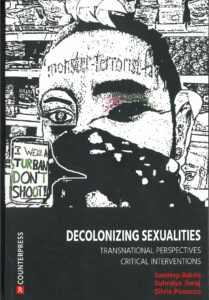
Decolonizing Sexualities
Transnational Perspectives, Critical Interventions
Publication | Table des matières | Critiques
Résumé
Decolonizing Sexualities: Transnational Perspectives, Critical Interventions contributes to the critical field of queer decolonial studies by demonstrating how sexuality, race, gender and religion intersect transnationally. The volume maps some of the specifically local issues as well as the common ones affecting queer/trans people of colour (qtpoc). The contributions are not delimited by traditional academic style but rather draw on creative inspiration to produce knowledge and insight through various styles and formats, including poetry, essays, statements, manifestos, as well as academic mash-ups. Queering coloniality and the epistemic categories that classify people means to disobey and delink from the coloniality of knowledge and of being. At this intersection, decolonial queerness is necessary not only to resist coloniality but, above all, to re-exist and re-emerge decolonially.
Table des matières
Foreword / Decolonial Body-Geo-Politics at Large (Walter D. Mignolo)
Prologue / Paris Black Pride 2016 (Nawo C Crawford)
Acknowledgements
Contributors
Introduction (Sandeep Bakshi, Suhraiya Jivraj, and Silvia Posocco)
CHALLENGE
Ch. 1 / Beyond Anti-LGBTI Legislation: Criminalization and the Denial of Citizenship (Sokari Ekine)
Ch. 2 / Post-colonial Perspective / Neocolo Chop Chop / Speak Out! / The Rabid Virus / The Oh My God Farce! / As If I needed a Reason / Nollywood What? (Mia Nikasimo)
Ch. 3 / Recounting and Reflecting on Resistance: The Dilemma of the Diaspora to Define (Raju Rage)
Ch. 4 / In Defence of a Radical Trans Perspective in the French Context (João Gabriell)
Ch. 5 / On Doing Work, or, Notes from the Classroom (Humaira Saeed)
CREATE
Ch. 6 / Decoloniality, Queerness, and Giddha (Sandeep Bakshi)
Ch. 7 / To Be Young, Gay, and African (Diriye Osman)
Ch. 8 / This Is How We Soften Our Hearts (Diriye Osman)
Ch. 9 / Femininty in Men Is a Source of Power (Diriye Osman)
Ch. 10 / Theoretical Coalitions and Multi-Issue Activism: ‘Our Struggles Will Be Intersectional or They Will Be Bullshit!’ (Sirma Bilge)
ALL POWER ACTIVISM
Ch. 11 / Dismantling the Image of the Palestinian Homosexual: Exploring the Role of alQaws (Wala AlQaisiya, Ghaith Hilal, and Haneen Maikey)
Ch. 12 / Decolonial Activism in White French Feminist Land (Lesbiennes of Color [Sabreen, Moruni, and Aria])
Ch. 13 / Lesbian of Colour Activism and Racist Violence in Contemporary Europe (Fatima El-Tayeb)
Ch. 14 / ‘Guarding Against Terrorism’: Testimony of a Singaporean Muslim Lesbian (Jun Zubillaga-Pow)
Ch. 15 / Stopping a Racist March—Activism Beyond the Incommensurability of (Homo)Sexuality and Religion (Suhraiya Jivraj)
NOW
Ch. 16 / Building an Inclusive Mosque: A Case Study (Dervla Zaynab Shannahan and Tamsila Tauqir)
Ch. 17 / Against Equality, Against Inclusion (Karma R. Chávez, Ryan Conrad, and Yasmin Nair for Against Equality)
Ch. 18 / Reasons For Optimism: Same Sex Marriage in Mexico City (Arturo Sánchez García)
Ch. 19. / (Decolonizing) The Ear of the Other: Subjectivity, Ethics and Politics in Question (Silvia Posocco)
Ch. 20. / QTPOC Critiques of ‘Post-Raciality,’ Segregationality, Coloniality and Capitalism in France (Paola Bacchetta)
Afterword / Interrogating QTPOC Critique, Imagining North-South Solidarities (Aniruddha Dutta)
Index
Critiques
- The volume is more than timely. First, it contributes to the field of decolonial queer theory, second it offers a transnational approach, third it never seeks to fix categories, and finally, and more importantly, it is centred on narratives of solidarity and alliance which are so important today in a world under the assault of financial capitalism, new politics of dispossession and colonization, and new politics of division and fragmentation.
— Françoise Verges (Chair Global South(s), College d’études mondiales, Paris) - The brave and thoughtful pieces in this book span across “intellectual” and “artistic” categorisations, and together make an important contribution not only to the field of sexuality/queer studies, but also to the ongoing battle to keep such studies from racist cooptation.
— Sarah Keenan (Lecturer in Law , Birkbeck, University of London) - The range and depth of these contributions make this an invaluable resource for students and researchers alike. Above all, these essays highlight the fact that we can no longer assume or theorize an LGBT identity or politics that is constituted outside of racialization, coloniality, place and time.
— Momin Rahman (Professor of Sociology, Trent University, Canada) - In a world in which colonialism and neocolonialism make their marks on sexuality as well as race and class, this rich volume shows that decolonial thinking and doing cannot be done without an attention to queer politics.
— Roderick A. Ferguson, Aberrations in Black: Toward a Queer of Color Critique - “This important volume from an authoritative international team of authors sheds significant new light on the comparative development of post-war Conservatism in the western world.”
– Stuart Ball, Professor Emeritus, University of Leicester, UK - “The rich essays collected in this illuminating volume show that the rise of right-wing politics in the United Kingdom, the United States, and France since the 1970s was a remarkably transnational phenomenon. As they attacked social democracy and cultural pluralism, right-wing movements borrowed ideas, visions, vocabularies, and tactics from each other, adapting them to their own national idioms and using advances in one country to win advances elsewhere. Anyone interested in confronting the problems that have proliferated in the wake the right’s reconfiguration of politics – surging inequality, belligerent ethno-nationalism, worker disempowerment and insecurity, and lost faith in the capacity for democratic self-government – has much to learn about the origins of these problems from this important book.”
– Joseph A. McCartin, Georgetown University, USA, author of Collision Course
